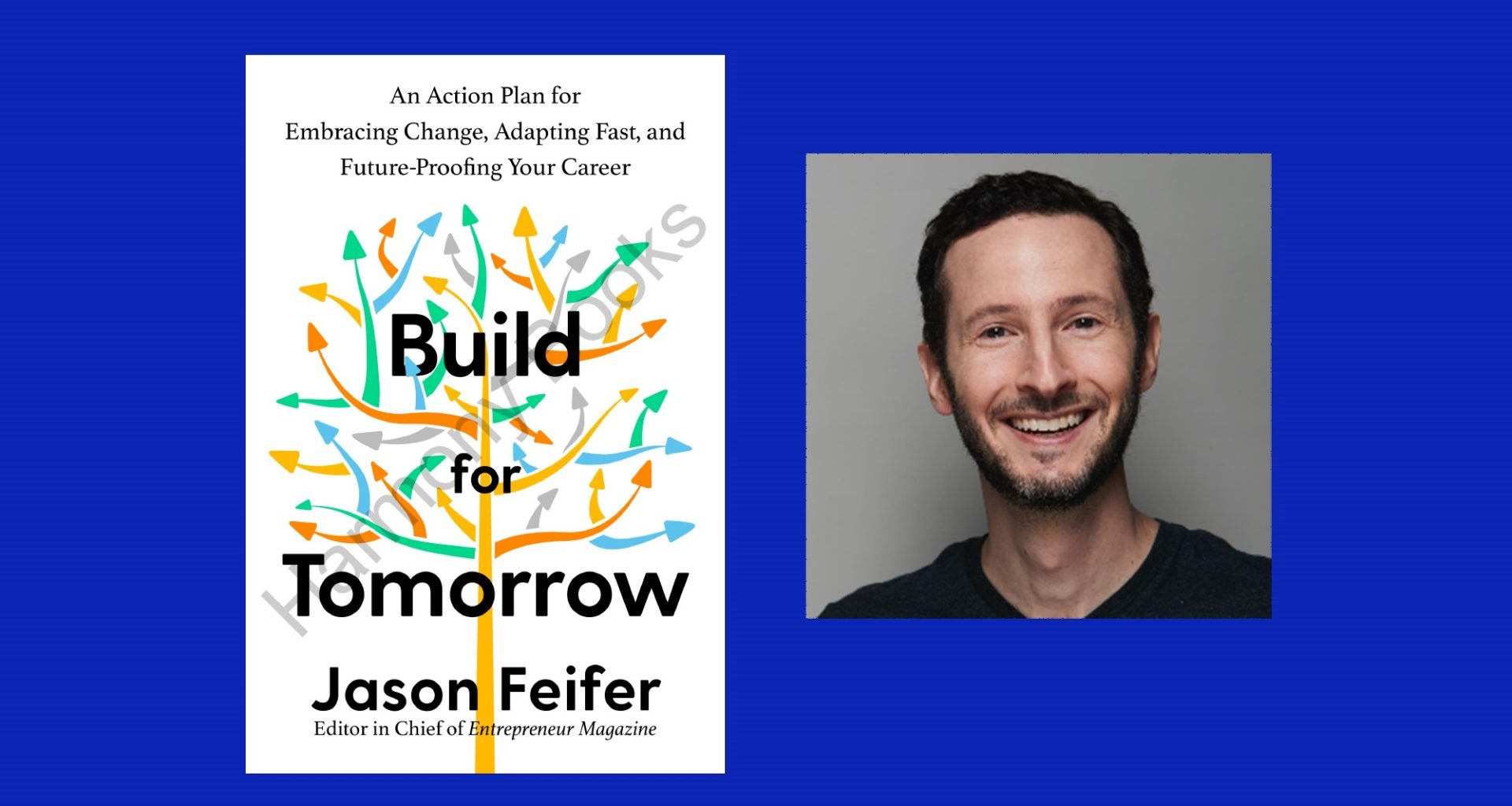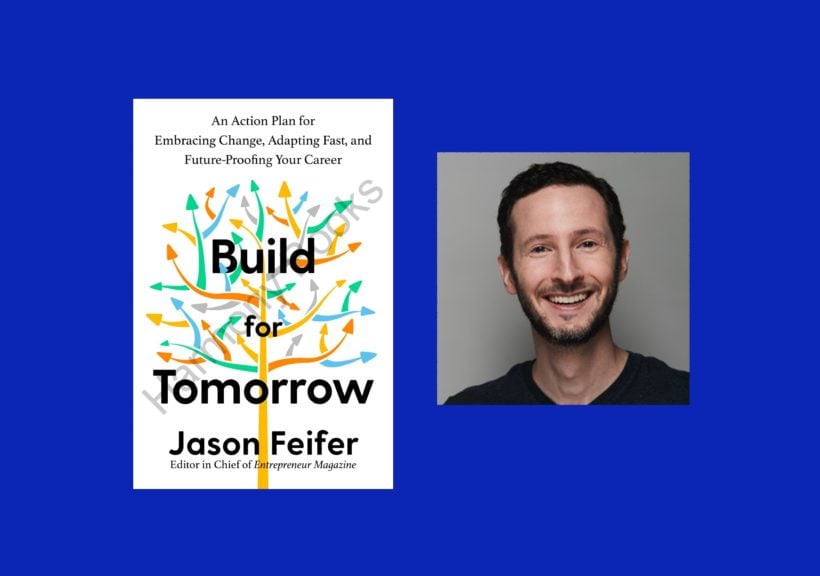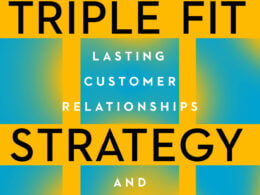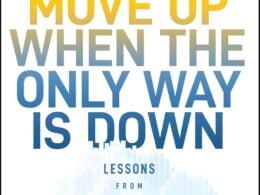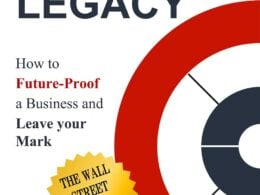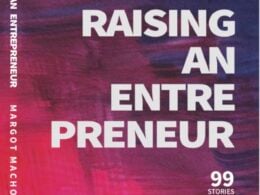Jason Feifer wants you to embrace change and use it to your advantage.
In a Q&A with StartupNation, the editor in chief of Entrepreneur magazine shares what he has learned from conversations with everyone “from global celebrities to Main Street heroes” on his website, his podcast and in his new book, “Build for Tomorrow: An Action Plan for Embracing Change, Adapting Fast, and Future-Proofing Your Career” (available Sept. 6).
In “Build for Tomorrow,” Feifer shares his four-step process for confronting change: panic, adapt, new normal and wouldn’t go back. He tells us he hopes readers thrive from the insights he’s gained from celebrity interviews as well as the pandemic.
- What inspired you to transform your podcast content into a book?
Although the podcast and book share the same name, they’re not actually the same content. The podcast tackles our most misunderstood problems, and uses history and science to understand them better. Meanwhile, as editor in chief at Entrepreneur magazine, I’m speaking to entrepreneurs and translating their greatest lessons and insights into useful stories for people in business. The book combines the two.
Here’s the thing — as I’ve done all this work, I realized that I was developing a powerful theory about how change happens and how the most successful people (today and across time!) take advantage of it. I wanted a place to really build that case, and make it as useful as possible for people. That’s the book.
- How long had you been thinking about the idea of crafting “Build for Tomorrow” before the book came to fruition? Did the pandemic have any influence on the direction of the book?
I’ve been thinking about this book for years, but it was never the right time. I knew I wanted to write a book about how change happens, but I didn’t have what I felt like was my big insight. What did I have to offer that wasn’t already said? The pandemic gave me that answer. By watching how everyone dealt with change at the same time, and understanding how some people adapted fast and got ahead while others fell behind, I came to the realization that change happens in four phases — panic, adaptation, new normal, and wouldn’t go back. That’s when I knew it was finally time to write the book.
- Lots of celebrities have entrepreneurial side gigs. How did you decide which celebrities, such as Maria Sharapova and Dwayne (The Rock) Johnson, to include in the book?
I picked the ones who told me the most interesting and useful things! Celebrities are, of course, operating at a different scale and with a vast array of resources that the average entrepreneur will never have access to. So much of their work is unrelatable. That’s why, whenever I sit down with someone famous, I spend my time digging for the human insight — the thing that this very successful person figured out for themselves, and that others could take value from. When they’re game for it, and really share the way they think, the outcome is special.
Whenever I sit down with someone famous, I spend my time digging for the human insight — the thing that this very successful person figured out for themselves, and that others could take value from.
- What was your writing process like?
I’m stretched really thin, so unfortunately couldn’t go on book leave or devote a concentrated amount of time to the book. So I made a plan: I would devote the first hour of every day, for eight months straight, to writing it. That’s how I did it!
- What part of the book are you most excited for readers to experience?
Is it lame to say “all the parts”? Honestly, I’m just most excited to hear the feedback from readers. I’ve spent years developing this book, and right now, as I answer these questions, only a small handful of people have read it. It’ll be wild finally getting it out into the world.
- What is the biggest takeaway from “Build for Tomorrow”?
There are a lot of them in there, but here’s what I hope people remember the most: We must reconsider the impossible. We often discard ideas that we think are too crazy or difficult — only to eventually realize that these were our best and most impactful ideas! We cannot wall ourselves off; we cannot limit what we consider. That’s the very nature of adaptability: It’s being willing to entertain the things outside your boundaries.
- Do you plan to write more books?
Maybe! Let’s see how this one goes.
- On your Instagram, you recently broke down your philosophy of “graduating” your ideas. What social platform is your go-to for initial idea testing? Why?
It used to be Instagram, but that platform is really starting to disappoint. Posts and stories no longer have the same reach, because IG is so obsessively focused on reels. So I’ve shifted a lot of my energy to LinkedIn, where the community is strong and discovery is much more robust.
- What is the most memorable moment of your career?
I’ve accomplished a lot of dreams in the past few years, but honestly, I think my earliest moves were the most important. They’re the ones I tend to reflect on the most. I quit my first two jobs to take big risks, and, in the process, learned a lot about the importance of getting outside the “traditional” path. I feel fortunate that I took those risks so early in my career; they laid the foundation for what I do now.
- When would you say you reached your “Wouldn’t Go Back” moment that you refer to in your book?
I’ve had a lot of them. When I first took the job at Entrepreneur, for example, I was deeply uncomfortable with the idea of giving people advice. I just thought of myself as a journalist who told other people’s stories, but never my own. Eventually, however, I realized how much potential was in front of me — if only I was able to step outside my comfort zone, and rethink the way I work and who I serve. It’s made all the difference.
- Where do you draw inspiration?
From conversations. I learn the most, and build upon ideas, and add to my understanding of the world, when I’m speaking with smart people.
- From podcasts to virtual consulting, you give a lot of different advice to lots of different people. How are you able to handle the stress, and where do you look for advice/tips?
I repeat this phrase to myself: I will do the best work with the resources available. That’s the best any of us can do. Frankly, although I do a lot, I am definitely not on top of everything. Things run late; some opportunities are missed or never pursued. But I don’t beat myself up about it, because I simply don’t have the resources to do everything all at once. So I take my time. I pick my battles. I do the best work with the resources available.
- What are your current favorite trends in the entrepreneurial world?
I love how work is being rethought right now. Ideas like the four-day workweek are really exciting and interesting, and I think we’ll end up with a far more efficient, thoughtful and equitable workplace as a result.
- What piece of advice would give to StartupNation readers, many of whom are young and/or aspiring entrepreneurs?
Do your job, but put as much energy as possible toward the stuff nobody is asking you to do. Learn things just because. Launch things without a guarantee of success. The more you push into the unknown, the more you will set yourself up for success later. You will never get ahead by just watching the person directly in front of you. Leap!


